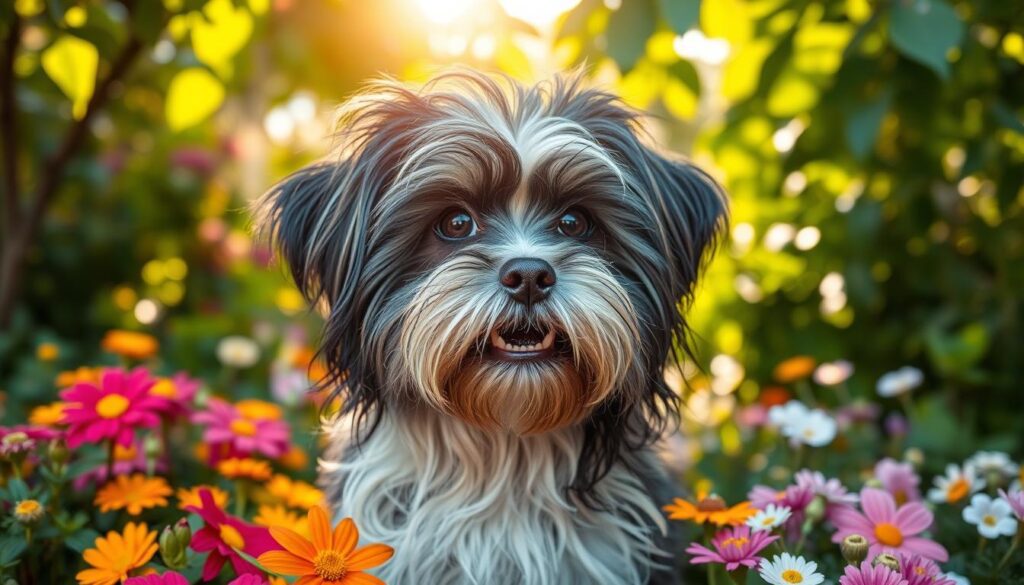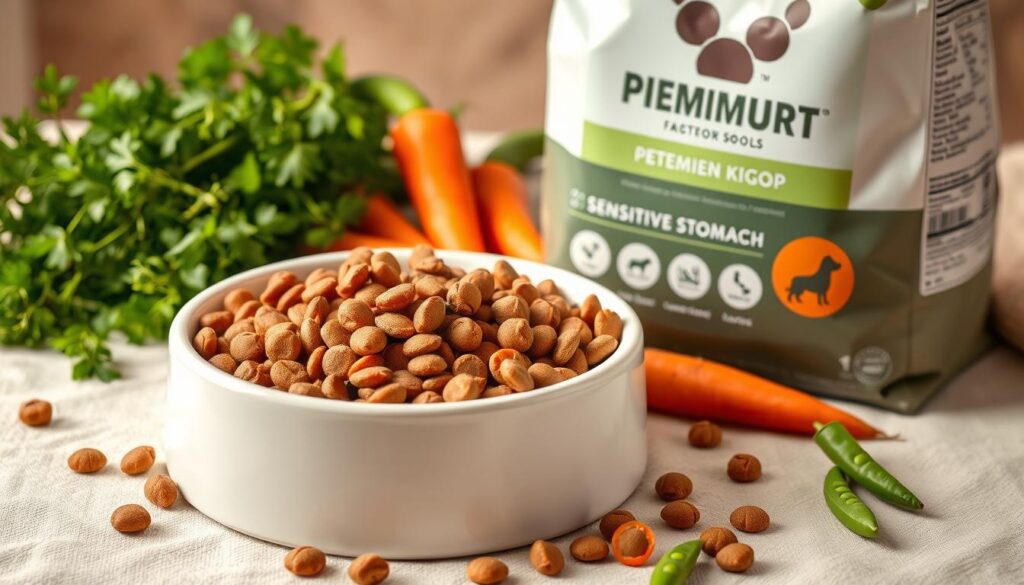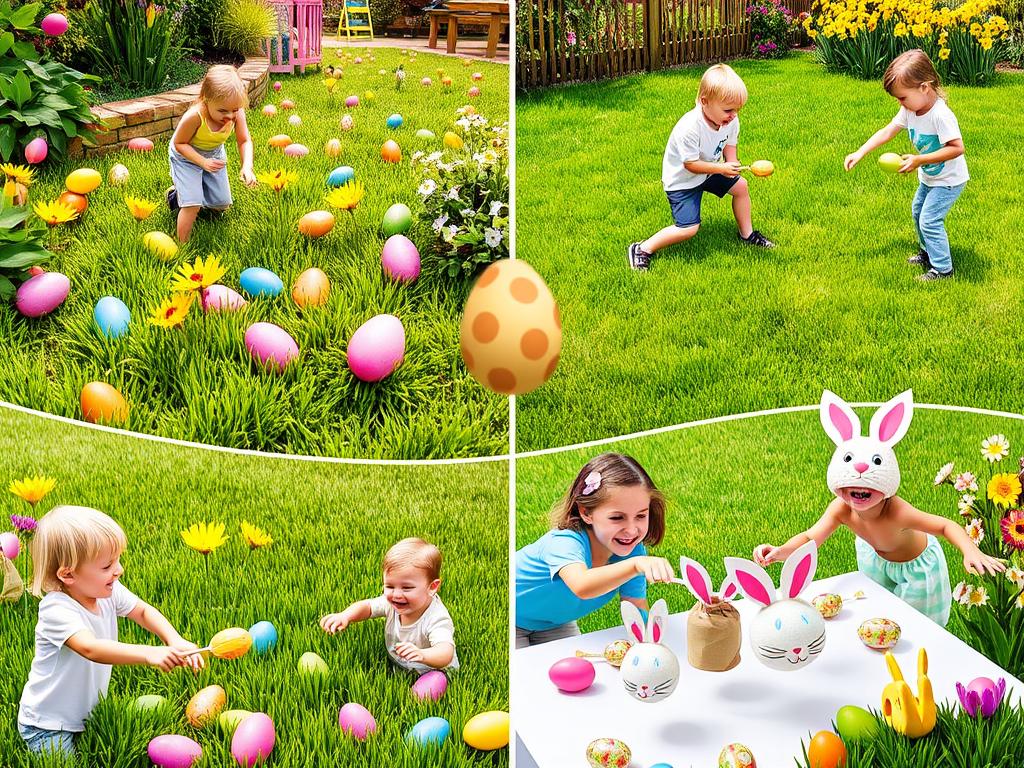Imagine a warm afternoon where a little ball of fur bounces around your feet, wagging its tail in pure delight. This was the scene in a family backyard a few years ago when a playful Havanese puppy named Bella captured the hearts of everyone around her. With her soft, silky coat and intelligent eyes, Bella instantly became a loyal member of the family. This story resonates with many who cherish the spirited nature and affectionate personality of their Havanese companions. Known for their unique traits, these little dogs provide endless joy, companionship, and a lot of love.
In this article, we will explore everything you need to know about Havanese care tips and why they are considered one of the great pets for families and individuals alike. From understanding their characteristics and health considerations to grooming and training essentials, this guide aims to equip both prospective and current Havanese dog owners.
Key Takeaways
- The Havanese averages 7 to 13 pounds, making them a perfect toy-sized companion.
- With a lifespan of approximately 14.5 years, they bring long-lasting joy to families.
- Regular vet check-ups help prevent common health issues like hip dysplasia and cataracts.
- Effective training techniques enhance their sociable and playful behavior.
- Grooming is essential to maintain their beautiful coat and overall health.
- A proper diet and exercise routine are key to their health and happiness.
Overview of Havanese Characteristics
The Havanese breed is known for its delightful combination of size, unique physical traits, and charming personality. Understanding the Havanese size and build is essential for potential owners, as these dogs not only adapt well to various living situations but also boast a rich variety of qualities that make them endearing companions.
Size and Build
The typical Havanese measures between 8.5 to 11.5 inches in height and weighs around 7 to 13 pounds. Their sturdy build is slightly longer than tall, featuring a deep chest and soft, folded ears. These dimensions contribute to their versatility, making them ideal for apartment living while offering a lively spirit perfect for families. The balance of their Havanese physical traits allows them to navigate both playful and relaxed environments seamlessly.
Coat and Color Variations
The Havanese is famous for its stunning double coat, which consists of long, soft, and silky hair that can be straight or wavy. Their Havanese colors are vibrant and diverse, including shades such as black, cream, chocolate, fawn, gold, and various brindle patterns. Regular Havanese grooming is crucial to maintain their luxurious coat and prevent tangling, with many owners choosing professional services to ensure their pet looks its best.
Temperament and Personality
Havanese dogs are characterized by their friendly and gentle disposition. High in affection and sociability, they thrive as loving companions. Their playful nature fosters strong bonds with family members, including children and other pets, showcasing a low tendency to bark and a medium energy level. This combination makes them approachable and adaptable, ultimately influencing their Havanese social behavior positively. With their eagerness to please and intelligence, training a Havanese can be an enjoyable experience for first-time pet owners.
This guide will help youexplore amazing while enjoying the delightful company of your Havanese by your side.
Health Considerations for Havanese
Maintaining the well-being of your Havanese requires awareness of their specific health considerations. These adorable dogs, while generally healthy, can face certain Havanese health issues. Understanding these challenges and incorporating proactive measures will contribute to their overall quality of life.
Common Health Issues
Havanese are predisposed to various conditions, including patellar luxation, heart murmurs, and eye problems. Regular monitoring and observation will help identify any symptoms early. Patellar luxation often leads to limping, while heart murmurs may not show signs until later stages. Recognizing these Havanese common problems is vital for effective health management.
Regular Vet Check-ups
Scheduling Havanese vet check-ups is essential to ensure your dog’s health remains a priority. These routine visits allow veterinarians to spot potential health issues, like hip dysplasia or skin allergies, before they escalate. Staying attentive to your Havanese’s medical needs will facilitate timely intervention and promote longevity.
Vaccinations and Preventive Care
Implementing a robust vaccination schedule will strengthen your Havanese’s immune system. Starting vaccinations early, ideally around six weeks of age, is crucial. Ensure your Havanese receives all core vaccinations as well as non-core ones recommended by your vet. Regular flea and tick treatments are also necessary components of Havanese preventive healthcare, safeguarding against diseases transmitted by pests.

In addition to medical attention, maintaining a balanced diet and ensuring proper exercise are cornerstones of Havanese health management. Such considerations contribute to their overall well-being, allowing these charming dogs to live healthier and happier lives. Explore a variety of ideas for healthy meals to maintain their energy, similar to the quick and easy recipes featured here.
Training Tips for Havanese Owners
Training your Havanese can be a delightful journey, filled with opportunities to strengthen your bond. This intelligent breed responds exceptionally well to positive reinforcement methods, making Havanese training effective and enjoyable. Starting early with the right approach can set the stage for Havanese obedience training and enhance their natural friendliness.
Basic Commands and Obedience
Introduce essential Havanese commands such as *sit*, *stay*, and *come* as early as possible. Consistency is key to achieving effective Havanese obedience training. Using treats as rewards encourages compliance and supports positive behavior. Effective communication through Havanese commands aids in shaping your dog’s understanding and responsiveness in various situations.
Socialization Techniques
Early Havanese socialization is vital for fostering a well-adjusted dog. Expose them to a variety of people, environments, and other animals to minimize timidity and prevent excessive barking. Engaging in Havanese interaction with different social settings allows them to develop confidence and a friendly demeanor. Proper socialization can positively influence their behavior with strangers, ensuring a more relaxed disposition.
Potty Training Strategies
Havanese potty training requires patience and dedication. Establish a regular bathroom schedule to assist in Havanese house training while incorporating positive reinforcement when they go outside. Creating a designated area for their bathroom habits encourages consistency. Crate training is another effective method, as it teaches them to hold their bladder for manageable intervals, aiding in overall Havanese potty training success.
Grooming Your Havanese
Maintaining your Havanese’s coat requires careful attention and a commitment to regular grooming. These charming dogs possess a double coat, which can easily become tangled and matted without proper care. Here are essential tips to ensure your Havanese looks its best and stays healthy.
Brushing and Bathing
Daily Havanese brushing is crucial to prevent matting, especially given their tendency to develop knots in both the top and undercoat. Line brushing effectively helps to keep the coat shiny and maintain its condition. Before Havanese bathing, it’s a good practice to brush your dog to avoid tightening any existing tangles. When it comes to bathing, choose a gentle shampoo and be sure to rinse thoroughly to prevent irritation and matting. A grooming spray or a mixture of conditioner and water can aid in minimizing static and hair splitting during brushing.
Haircut Styles and Maintenance
Many owners opt for different Havanese grooming styles to manage their pet’s hair more easily. Choosing a professional groomer can offer valuable insights into appropriate Havanese haircuts for the season. Regular maintenance is important to keep their coat healthy, and you will find that shorter styles may be beneficial during warmer months, allowing for easier Havanese coat maintenance.
Ear and Nail Care
Routine Havanese ear care involves checking for wax buildup and cleaning when necessary to prevent infections. Additionally, regular Havanese nail trimming is important for your dog’s comfort and mobility. Establishing a routine that includes checking ears and nails can significantly enhance your pet’s overall Havanese hygiene. Consistent grooming not only fosters a strong bond between you and your Havanese but also ensures that your furry friend remains happy and healthy.
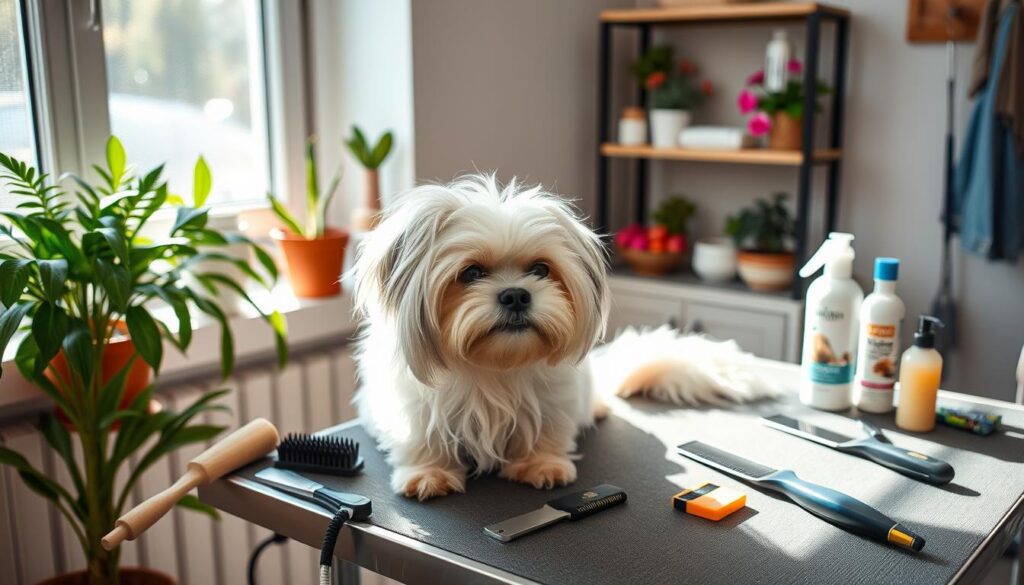
Nutrition Guidelines for Havanese
Proper nutrition plays a vital role in maintaining the health of your Havanese. This breed requires a balanced and high-quality diet to thrive, which can significantly impact their lifespan and overall well-being. Understanding the intricacies of the Havanese diet can help you support their unique needs as they age.
Choosing the Right Dog Food
Selecting the appropriate Havanese dog food is critical for optimal Havanese nutrition. Look for high-quality options rich in protein, vitamins, and minerals designed for small breeds. Nutritional quality influences not only their physical health but also their energy levels and vitality, which are paramount for this energetic breed.
Portion Control and Feeding Schedule
Effective Havanese portion control is essential. Adult Havanese dogs generally need between ½ to ¾ cup of food daily, split into two meals. This feeding schedule helps in managing their weight and preventing obesity, a common concern in this breed. For puppies, provide smaller portions, approximately ¼ to ½ cup, three to four times daily. Senior dogs may require adjustments, often needing around ½ cup, depending on their activity levels.
Treats and Special Diets
When it comes to Havanese dog treats, moderation is important. Opt for healthy options that complement their diet without adding excessive calories. Consult your veterinarian for any Havanese special diet needs, especially if health concerns arise that necessitate dietary modifications. Incorporating Havanese health snacks that are low in calories can also be beneficial for training and bonding.
Exercise Needs for Havanese
The Havanese breed requires attention to their exercise routine to maintain their overall health and well-being. Understanding their activity requirements can help owners provide a balanced lifestyle for these delightful companions.
Daily Activity Recommendations
To meet their Havanese exercise needs, daily walks are essential. Typically, a few brisk walks throughout the day help cater to their moderate activity level. Regular physical engagement not only aids in physical health but also supports their energetic nature.
Fun Activities to Engage Them
Havanese enjoy a variety of fun games that tap into their playful nature. Activities such as fetch or agility courses keep them entertained and offer ample Havanese enrichment. Engaging in Havanese funny activities can be just as beneficial, creating fond memories while allowing them to stimulate their bodies and minds.
Mental Stimulation
Mental challenges play a significant role in the life of a Havanese. Incorporating cognitive activities into their routine, such as puzzle toys or training new tricks, ensures they receive adequate Havanese mental stimulation. This not only alleviates boredom but also leads to a joyful and well-adjusted pet.
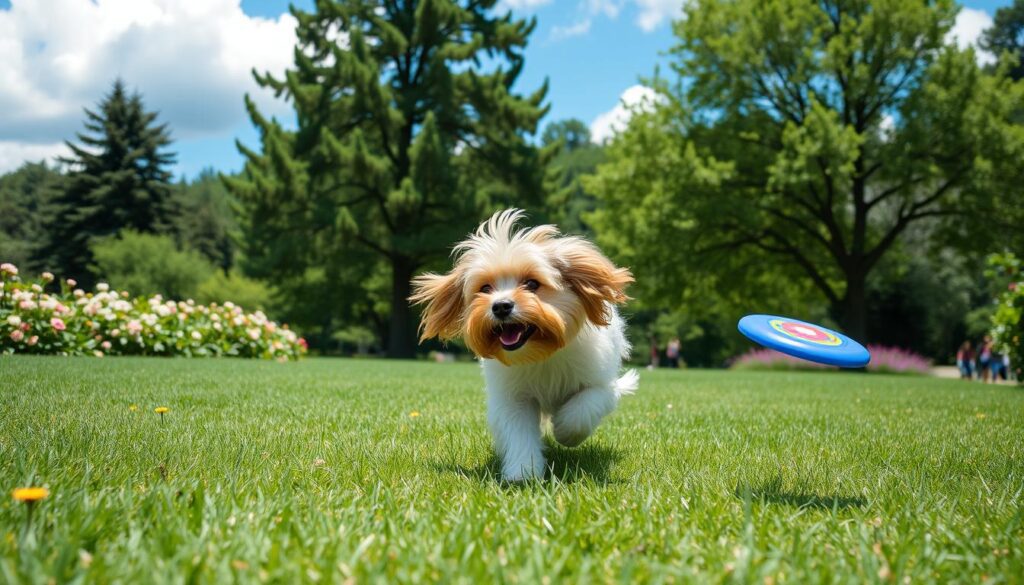
Why Havanese Make Great Family Pets
The Havanese breed stands out as a fantastic choice for family pets due to their friendly disposition, sociability, and willingness to bond with family members. These characteristics contribute significantly to their reputation as the ideal Havanese family dog, especially in homes with children.
Compatibility with Children
Havanese dogs are known for their strong Havanese compatibility with children. They possess a playful and affectionate nature, making them excellent companions for Havanese kids. Interactions between Havanese and children often lead to laughter and cherished memories, as these dogs enjoy engaging in various playtime activities. Their gentle temperament ensures that they can handle the typical excitement of younger family members, fostering a safe and joyful environment.
Interaction with Other Pets
The sociable nature of Havanese extends to their Havanese pet interactions. These dogs usually get along well with other animals, including both dogs and cats. If socialized early, they demonstrate positive Havanese behavior with other animals, contributing to a harmonious multi-pet household. Their friendly disposition allows them to adapt seamlessly to various living situations, enhancing the overall family dynamic.
Loyalty and Bonding
Havanese loyalty is one of the most celebrated traits of this breed. They thrive on companionship and nurture deep emotional connections with their families. This strong Havanese bonding leads to trusting relationships that elevate their role as beloved family members. Havanese dogs are known for their affectionate nature, often seeking the company of their humans, which reinforces a sense of security and love within the home.
Adoption and Buying Havanese Puppies
When it comes to Havanese adoption, selecting the right puppy is crucial for ensuring a happy and healthy life together. Choosing a reputable breeder is essential; responsible breeders prioritize the health and temperament of their dogs, offering valuable insights into the puppy’s lineage and providing necessary health clearances. However, adopting a Havanese from rescue groups can also lead to rewarding experiences by providing loving homes for dogs in need.
Choosing a Reputable Breeder
Finding a trustworthy breeder involves more than just browsing websites; it requires research and asking the right questions. Inquire about the breeder’s experience, breeding practices, and any health concerns specific to the Havanese breed, such as hip dysplasia or cataracts. Evaluate their facilities to ensure they’re clean and safe for the puppies. Remember that the Havanese puppy selection process should include assessments of the puppies’ demeanor and any documented health history, solidifying your decision further.
Considerations for Adoption
Before bringing a Havanese into your home, reflect on your lifestyle and whether you can meet the breed’s needs. Assess your readiness for daily exercise, grooming, and socialization, as Havanese thrive in environments with positive interaction. Consider which option aligns best with your situation: purchasing a puppy from a breeder or adopting a Havanese through rescue groups. Both paths lead to unique rewards that can bring joy into your life.
Cost of Ownership and Long-term Care
The Havanese ownership cost can vary significantly, with initial puppy prices ranging from $600 to $1,800. Ongoing expenses include quality food, grooming, veterinary care, and possibly pet insurance, which is advisable due to the breed’s susceptibility to certain genetic health issues. Committing to Havanese long-term care involves understanding these costs and preparing to ensure the well-being and happiness of your pet throughout their average lifespan of 14-16 years.

